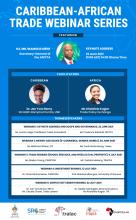Caribbean-African Trade Webinar Series
June 14, 2021
Caribbean-African Trade Webinar Series
Single zoom registration entitles you to any and all events here.
Keynote Address
H.E Mr Wamkele Mene, Secretary-General of the AfCFTA
Facilitators
NEWS: 6.12.2021
Call for Papers: 6th Annual Competition And Economic Regulation (ACER) Week
June 11, 2021
6th Annual Competition and Economic Regulation (ACER) Week
Online courses and call for papers
20 - 29 SEPTEMBER 2021
Twenty Second Sovereign Debt News Update: African Debts and the Question of Sustainability
Twenty First Sovereign Debt News Update: African Governments on an Increasing Debt Binge
Call for Papers: African Economic Conference 2021 themed "Financing Africa's Post Covid-19 Development"
June 7, 2021
Call for Papers: 2021 African Economic Conference
About 2021 AEC
The 2021 edition of the African Economic Conference is jointly organized by the African Development Bank (AfDB), the Economic Commission for Africa (ECA) and the United Nations Development Programme (UNDP)
The theme of this year's conference is "Financing Africa's Post COVID-19 Development"
Central Bank Independence and Institution Building During the Neo-Liberal Era: The Case of Bank of Zambia
Call for Application: University of the Witwatersrand School of Law has Six Positions for Associate Professor/Senior Lecturer
June 5, 2021
Job Title: Senior Lecturer
Organization Name: School of Law
Department Description
Banking Law, Corporate Law, Competition Law, Customary Law, Cyber Law, Access to Information and Privacy Law, Information Technology Law, Civil Procedure.
Call for Application: Postdoctoral and Postgraduate Funding Opportunities in 'Law, Equality and Social Justice', Wits School of Law
June 4, 2021
NRF SARChI Chair in Equality, Law and Social Justice
Postdoctoral and Postgraduate Funding Opportunities in 'Law, Equality and Social Justice'

